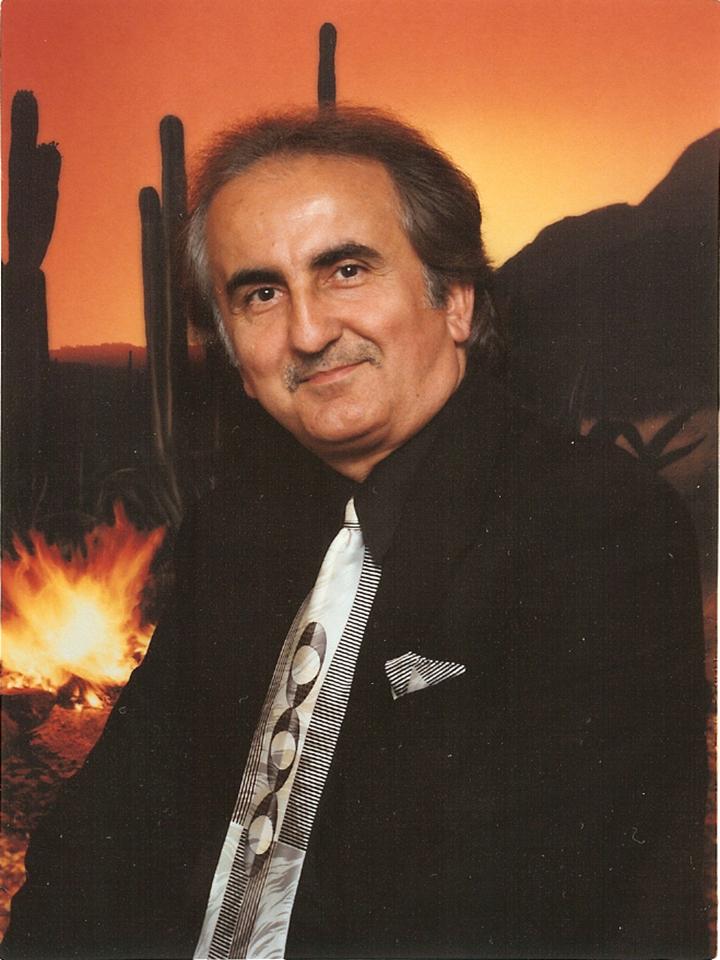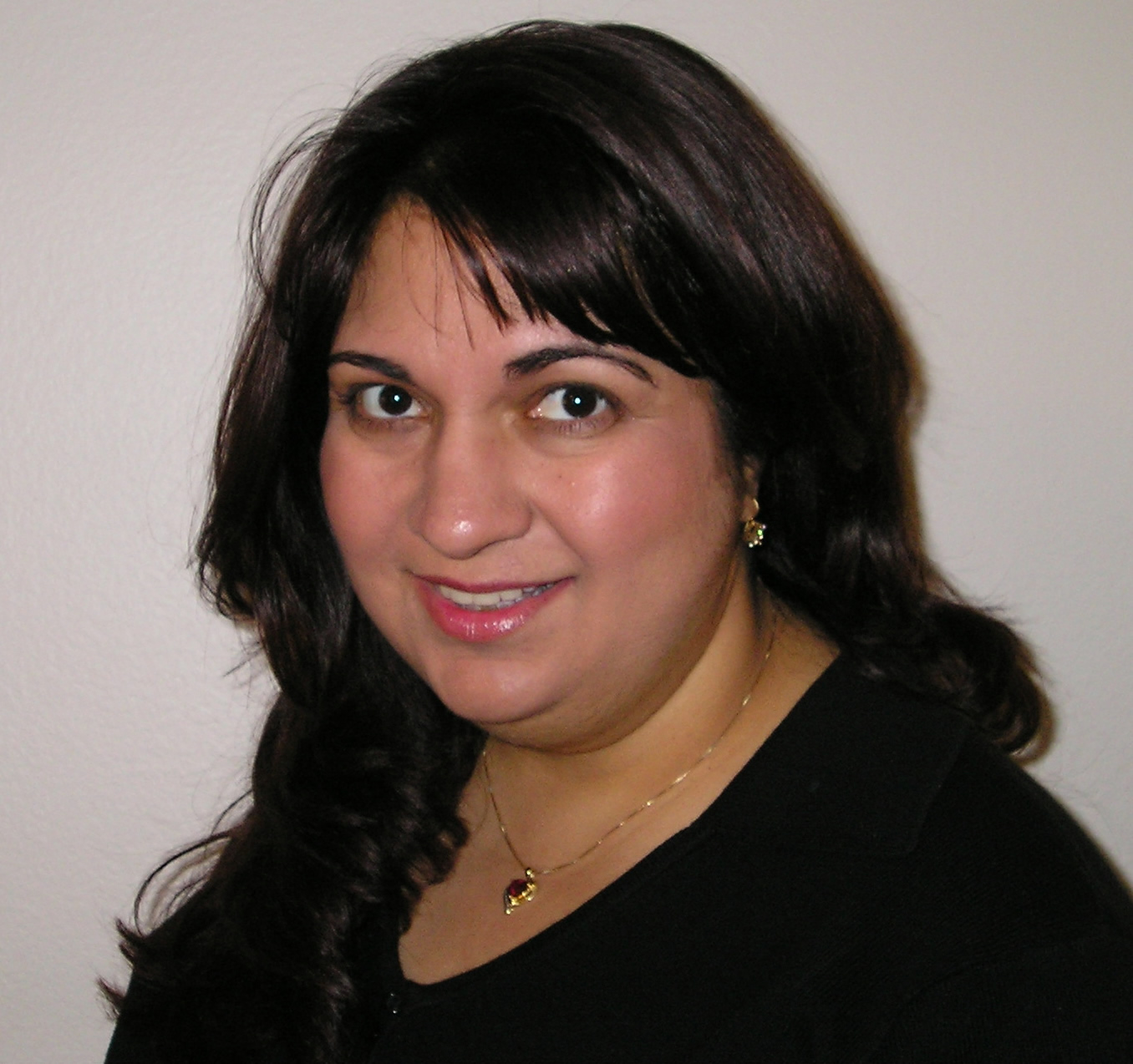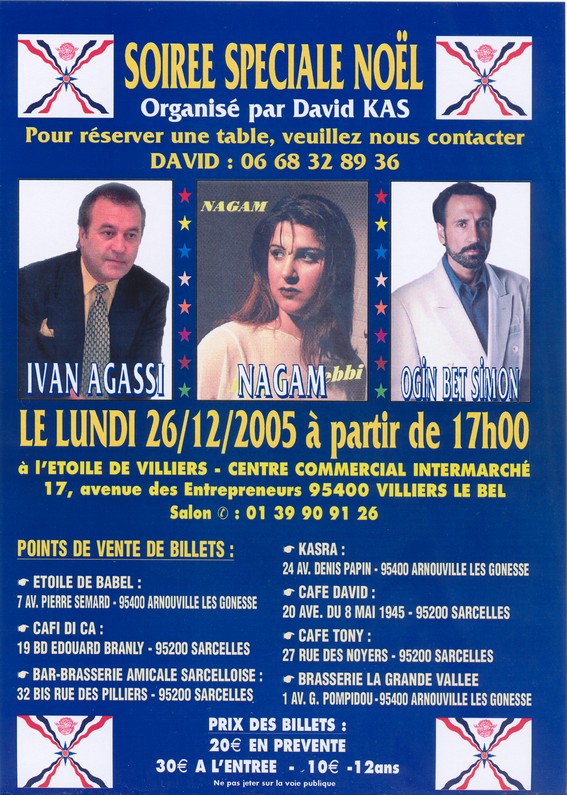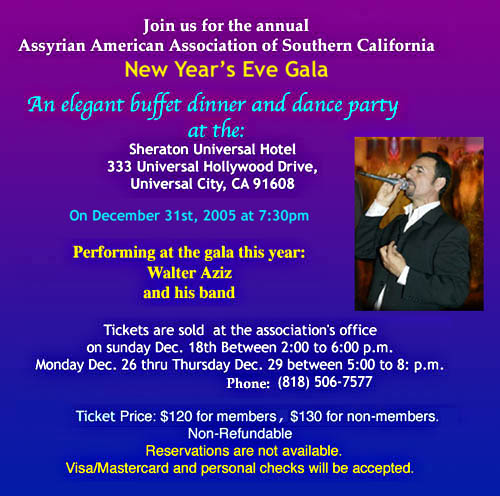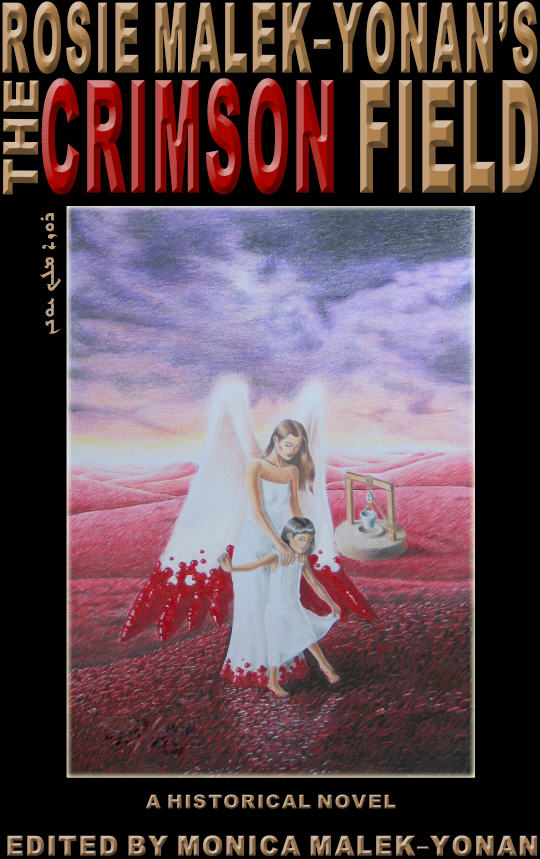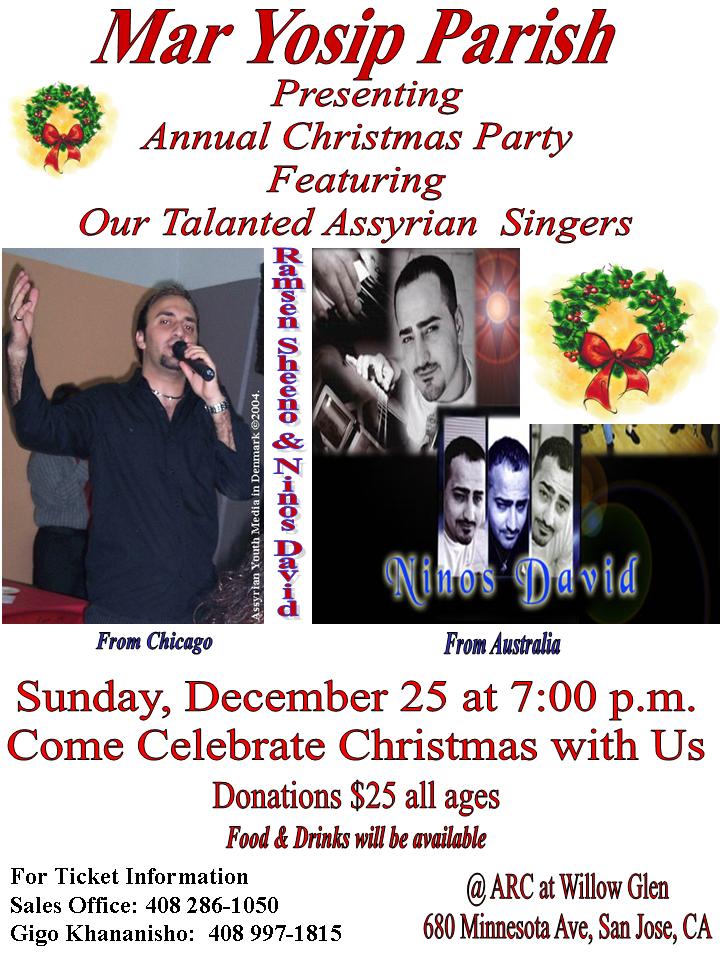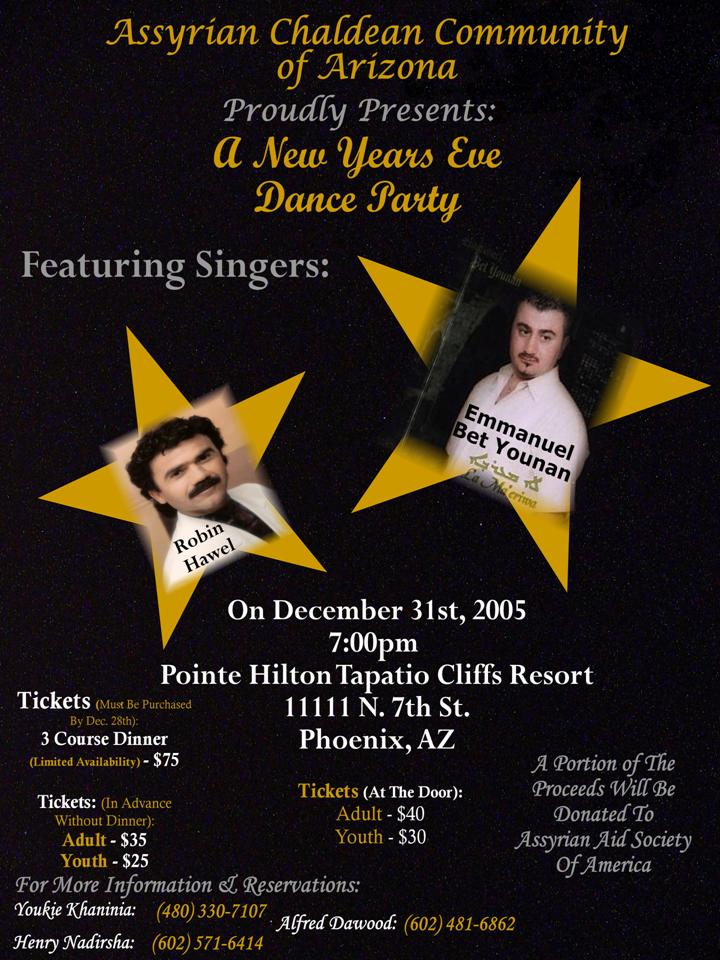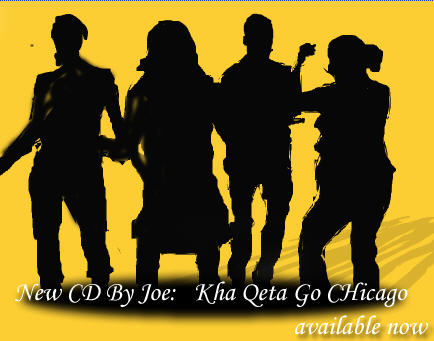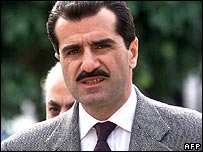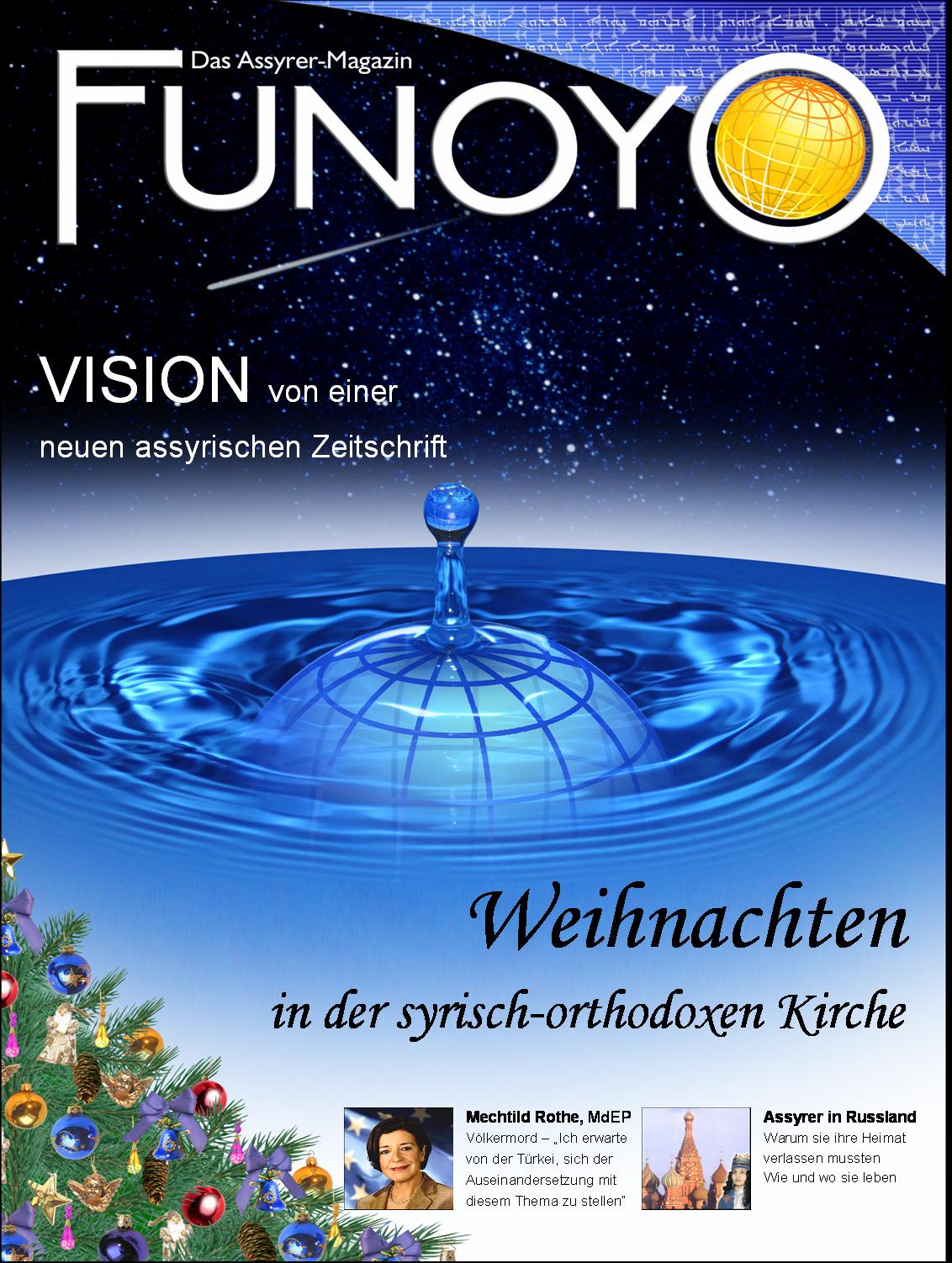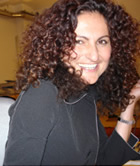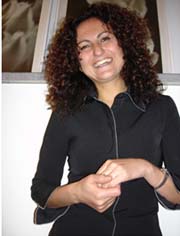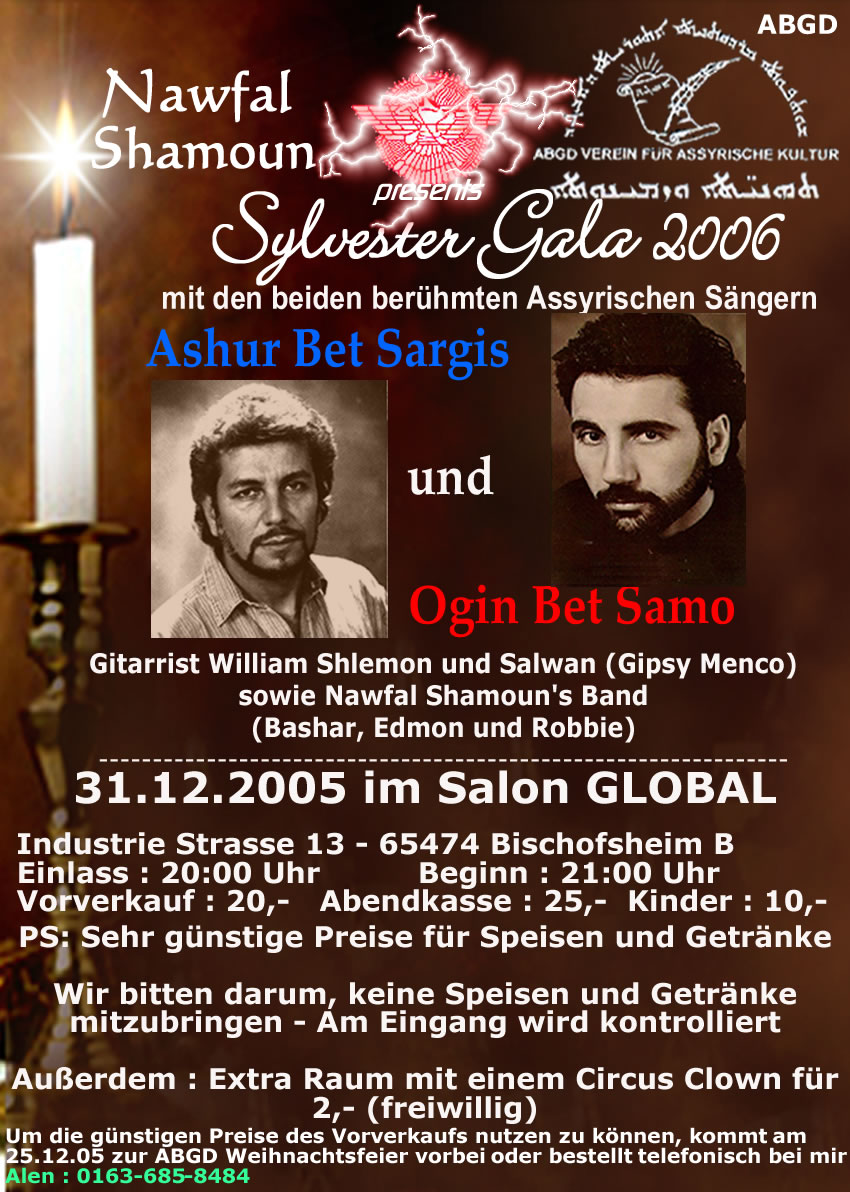|
Volume XI |
|
|
|
Office 202-349-1429 | zcrew@zindamagazine.com | Fax 1-415-358-4778 |
1700 Pennsylvania Avenue. , NW Suite 400 Washington, DC 20006 U.S.A. |
|
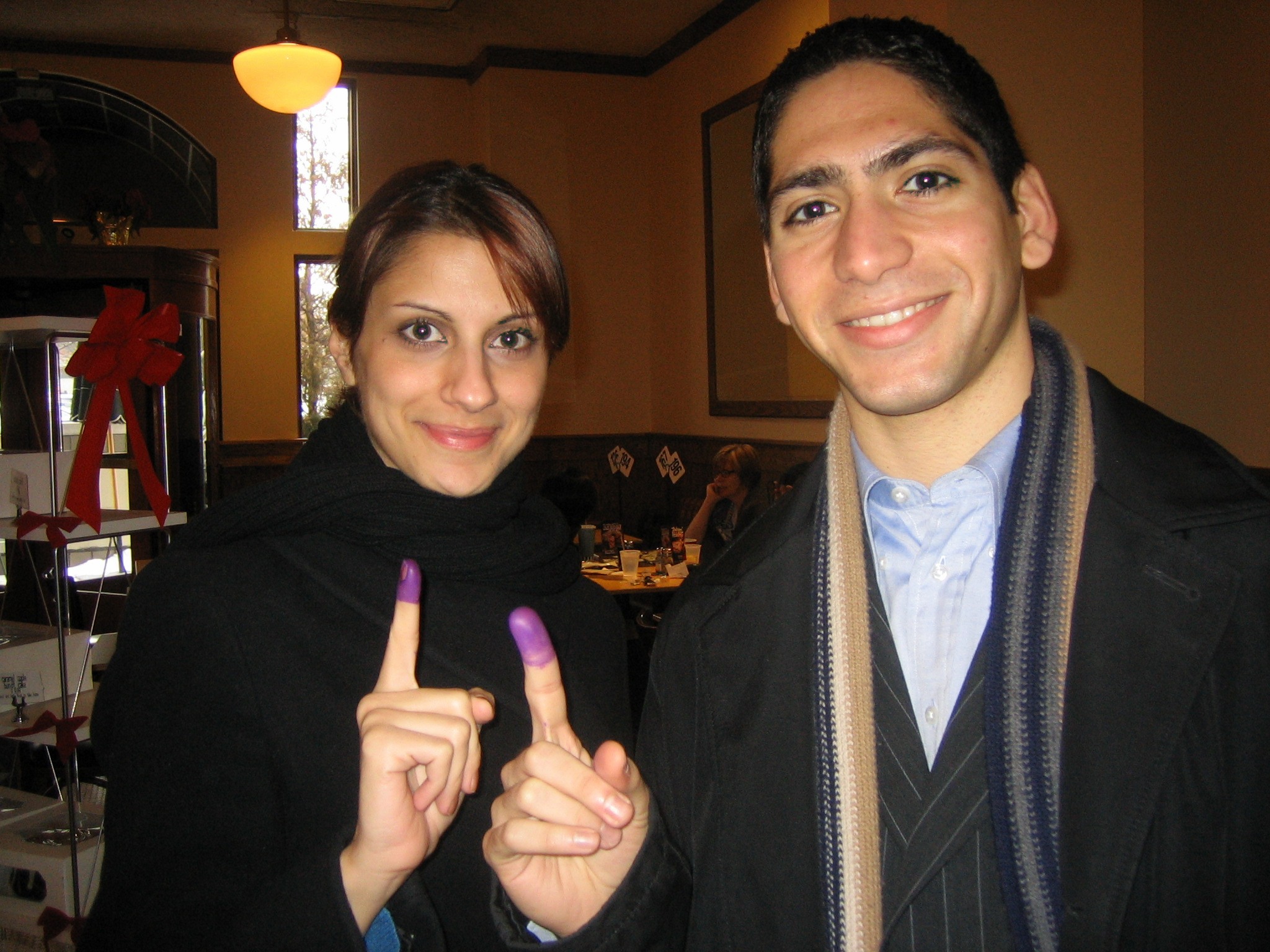 |
Assyrians Proudly Display Their Purple Badge of Courage |
Waleeta Canon & Paul Isaac of Washington D.C. flaunting their purple-inked fingers after voting on December 15. |
|
|
|
An Interview with Nineb Lamassu |
Ninos Warda |
|
|
Kurdish President Offers Refuge to Christians
Concern Expressed for Assyrian Christians in Iraq |
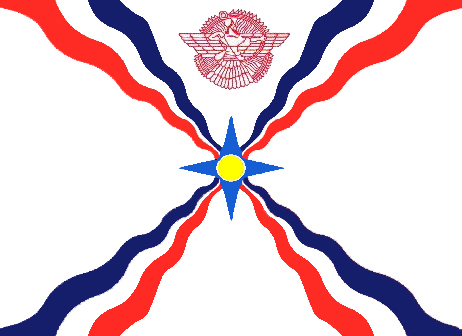 |
|
|
Iraqis Come From All Over West Coast to Vote in Pleasanton
Less Than 4,000 Ballots in San Diego
Christian Persecution Growing
Gamri Demands Release of Prisoners from Syrian Jails
Assyrian General Takes Tea with Fairfield Mayor |
|
|
|
|
|
On Church Reforms & True Beauty
What I Saw or Did Not See at the Elections Today
Assyrians Voting in Chicago
Kurdish President's Offer Not An Enduring Solution
Slate 740 is a Triumph for Unity
What About Mar Aprem Mooken?
Sabri Atman in Berlin |
Click to Learn More
ZINDA CALENDAR
ZINDA ARCHIVES |
|
|
Assyrian Star Asks For Information on Assyrian Drama
Bring a Smile to a Child in Nineveh!
New Year's Even Party in Germany |
|
|
|
The Spiraling Dance of Survival
Remembering Gibran Tueni |
|
|
|
Gunilla Samuelssons |
|
|
|
|
The Lighthouse
Feature Article
|
|
An Interview with Nineb Lamassu
Ninos Warda
United Kingdom
As a full-time student at University, a full-time employee at a TV station, an active Assyrian, and a caring father and husband, Nineb Lamassu is no stranger to hard work and determination. I think that at this moment in time in our Assyrian nation’s history, these two characteristics in any Assyrian are of prime importance to its general survival. As such, I thought Nineb Lamassu would be a great individual to conduct an interview with. With the hope of enlightening readers around the world not only about Nineb’s personal thoughts on matters important to him, and Assyrians generally, but also to encourage other Assyrians, particularly the youth, to work hard and be determined enough to sacrifice in any way they can for the good of our Assyrian nation and people.
Knowing that Nineb feels very passionately about his studies, I thought to start off the interview with him giving a brief explanation of the subjects he studies at University. He is currently doing a BA in Ancient Near Eastern Studies at SOAS (School of Oriental and African Studies), which is part of University of London. It is a multi disciplinary degree with language at its centre. For example: Nineb has a few units of ancient history and archaeology of the Near East which cover Egypt, the Levant, Anatolia and of course Mesopotamia. His core subject though is Akkadian, and he is also studying Assyrian of Edessa which is often referred to as Syriac; next year he will even start with Sumerian too! Talk about finding and going back to your roots!
It becomes clear then from his chosen studies that Nineb finds language both fascinating and alluring. Nineb mentioned during the interview that there are many factors which encouraged him to pursue this field of study, but the two main ones he mentioned were very personal and touching experiences, probably felt by many Assyrians also! His first main reason was:
“1- When I was a young kid back home I was always told about my dad’s uncle - Shamasha Shawil D’Baz - being very good at our language. And this language they used to refer to as Lishana Atiqa. So one summer day my late father and mother took the whole family for a trip to Khorsabad, which is ancient Nimrud. There my mum and dad were showing us around and telling us that this was the work of our ancestors. As they were doing this, my father pointed to cuneiform writing on the wall reliefs and told us that this is our ancient language (Lishanan Atiqa), and that is when me, a typically excited kid who thought he knew it all, said: “yes, this is the language that uncle Shawil reads, if he was here he would read it all.” Much to my surprise my dad said: “No, he will not be able to, this is even more ancient than what he is able to read.
So this created some form of curiosity in me as to why do we have a language which is older than what we speak and one which is even older than that. It did not make sense so this curiosity has always driven me to pursue this matter further, and the more I learned the more I felt my knowledge resembles a little drop in this bottomless ocean.”
He then continued with his second reason:
DAVID YOUKHANA
|
|
ARIZONA
Real Estate-Relocation-Investment |
|
Associate Broker
Certified Commercial Sales Specialist
Realty USA southwest
Glendale, Arizona 85310
Click Photo For More Information |
602-410-9555
|
|
“2- I remember once back home, my dad and his friend had managed to take my oldest brother with them to the library and had taught him how to sneak a book called “The Assyrian Revolt” (this was Iraq’s official and biased version of the 1933 Semele Massacre), and that was the only official book that I had seen written about the Assyrians in Iraq. So when I first got to New Zealand, I was at the library and I was surprised to see books about Assyrians which I could borrow without any fear of persecution. I still remember the first books that I borrowed. One was “Assyrians and Their Neighbours” which had Assyrian writing on its front cover, and the other one was “The Might That Was Assyria” written by H.W.F. Saggs (which passed away just recently). The latter had a big impact on me and I had no idea that fate would have it for me to end up studying at the same university which the author had graduated from. Nevertheless, Saggs’s book re-kindled that passion in me to find out more about our past.”
Probably as a result of these experiences, Nineb thinks it is of pivotal importance for fellow Assyrians to study this subject. As he accurately opined: “Up until now all of our history has been written from a non-Assyrian perspective, with the exemption of some Assyrians like: Fredrick Aprim’s recent book. So we always lament the fact that we are being maligned by these non-Assyrian writers but never actually doing something about it. It is high time that zealous Assyrian youth with the support of Assyrian institutions take an action and change the current statues quo.”
Given the fact that we are now living in an increasingly technological and multimedia world making it a much smaller place as a result, I posed the question to Nineb as to whether he thinks Assyrians generally are doing enough with the technology and multimedia capabilities we have access to today to raise Assyrian awareness and enrich and enliven Assyrian culture and language, and if not, what changes or recommendations would he like to see to better help fulfil this goal? Nineb noted that the progress made in these last years in multimedia communications has changed our life tremendously and that we no longer live in isolation in our part of the planet; the world has become a global village. He continued, “A few Assyrian websites have seized this opportunity to humbly serve our culture; Zinda Magazine, AINA and learnassyrian.com are great examples of this pioneering step. And some of these websites also publish in Assyrian like Nohadra.com and Ankawa.com. But there is an urgent need for an Assyrian only website to serve as a platform for the many Assyrian writers to publish their works.”
We also briefly discussed Assyrian Press Day and the publication it commemorates, i.e. Zahrire d’Bahra. Nineb thought that the commemoration of Assyrian Press Day is a great idea, but in his personal opinion, Zahrire d’Bahra should not be considered the first Assyrian publication, because although it was written in Assyrian, it was not Assyrian in the full sense of the word, i.e. it was purely an American Missionary publication predominantly covering ecclesiastical matters. Nineb went on to compare this with the ‘Khokhwa’ magazine which in his opinion was Assyrian ‘pure and simple’ and represented the true voice of the Assyrians aspirations; with great writers such as: Praydoon Athuraya and Rabi Benyamin Arsanis as contributors.
I felt the need to ask Lamassu who he would consider as his greatest inspiration(s) with regards to his love for the Assyrian language and why? Furthermore, I asked who he hopes to inspire through his poems, articles and other works in the Assyrian language. His reply was both in itself inspiring to others and filled with the names of great Assyrians writers, past and present:
“Inspiration and not imitation is very important. Every individual is inspired by someone or something. However, as that individual grows so this inspiration changes, not by losing respect to ones earlier inspirers but by finding others far beyond ones intellectual reach as a new source of inspiration.
I personally am always inspired by my personal love for my people, language and culture. Doctors tell us that there are two forms of cholesterol: that which is negative and that which is positive. Thus my love for our people, language and culture can be termed as positive addiction, the more I get the more doses of it I need, and this to me is an endless source of inspiration. Luckily I have a wife that understand and shares the addiction.
No doubt though, I am also inspired by great Assyrian individuals such as: the assertiveness of Enheduanna, the great contributions of Odisho D’Sowa, Thoma Audo, Qasha Yosip D’Qillayta, Qasha Paulos Bidaro, Na’um Faiq, Mor. Youhanan Dolabani, Abdil Masih Qarabashi, Odisho Malko Ashitha, Daniel Dawed D’Bet Benyamin, and of course Gabriel Afram.
I would like to inspire you and other Assyrian youth like you but more importantly my son who is three years old. If we are unable to have today’s children inspired and absorb our language and culture like a sponge, and treasure it with their life, then our survival in the future looks very bleak to me.”
It is unfortunate that Nineb’s last sentence is a grim reality, and this led appropriately to the next question concerning the Assyrian youth itself. I thought it appropriate to ask Nineb to draw on some of his experiences of working with the Assyrian youth. His answer put a secret smile on my face and assured me of the fact that it is not just the Assyrian youth of London which has these problems and weaknesses:
“The youth carry the seeds of continuity: more importantly though, they are a natural current of change and progress, and in that lays their most salient factor of strength. Their primary weakness is their sheer love and passion which lacks maturity (in the form of what to do and how to do it) which leads to no sense of direction.
According to a certain school of philosophy it is possible to change society for the better as history clearly demonstrates that but not without a struggle. This is due to the fact that there must be something existing there, something old. Before there could be something better; something new: that is come to change society. Because of this a conflict always arises between these two factions of society. The old: in our community’s case the church, clubs, political parties, and institutions always strive to keep everything as it is and will use any tactic to deter the youth’s resolve and determination. Most often they will penetrate the youth and dilute their thoughts and ideas, and convert them into petty committees that assure their survival up in the hierarchy.
It is important for the youth to be conscious of this weakness, recognise their strength, and know; they are the most important element of our community and a mechanism of pivotal importance: then they need to organise, educate themselves and serve the people not as elitists but as equal pillars that hold this nation together and carrying the heaviest share of the burden.”
Before concluding the interview, I thought that no interview with Lamassu would be complete without talking about Assyrian poetry. In Nineb’s poetry one finds many powerful allegories which possess a different meaning from that which a reader might initially construe. One such example is his poem “Khuba d’La Methpakham”, “Unequivocal Love”. I asked Nineb how important it is for him, as an Assyrian, to write prose and poetry allegorically, and how he thinks this adds to the depth and flavour of the work and stimulates the reader’s understanding of the author’s intended meanings.
Nineb was indisputable in his view that a poet always tries to say something in a way in which it has never been said before, and that this element is what makes writing, poetry. Because anybody can tell his beloved ‘I love you’ but a poet always says it differently. He admitted also that there are other elements involved like rhythm and the ability to play with language ‘as if it was dough or paste in ones hand’, but no doubt allegories play a vital part in Nineb’s works:
“You are right, allegory does play an essential part in most of my poetry, and this is a natural manifestation of various influences, like García Lorca and Pablo Neruda, and Khuba D’La Mithpakham is one of these manifestations. But I also write in a more direct and straight to the point style, although I am careful not to undermine the poetic value of my work, such as: “Ama La Mtaksa”, “Khokhtha D’Ganawe” and “ ‘Pata’e Khmare”, and these could be traced to the influence of other poets, like Mdhafar Nawab for example, or even Mar. Narsai and Rabi Benyamin Arsanis for that matter.
I think the idea or more precisely the intended message of the poem determines the style of the poem. And if the writer is successful in saying something new, something important and something creative, I think it will stimulate the reader regardless of its style of expression.”
Upon reading some of Nineb’s works, the attentive reader is left in no doubt that his allegorical writings, his insatiable passion for the Assyrian language, and his incessant love for his people, all combine to make reading his works enjoyable, thought-provoking, and just as importantly, in my personal opinion, teeming with an abundance of accurate Assyrian words and phrases.
|
|
Good Morning Assyria
News From the Homeland
|
Kurdish President Offers Refuge to Christians
Courtesy of the Iberpresse
8 December 2005
(ZNDA: Arbil) The President of Iraqi Kurdistan, Massoud Barzani, says they will welcome all Christians seeking refuge from the critical security situation in other areas of Iraq who want to stay definitively or temporarily in the region. At a meeting of religious leaders and members of the Christian community in Kurdistan, Barzani said: "We welcome any Christian brothers who choose to come and live in Kurdistan, whether temporarily or more permanently. This is their country and we will not prevent any of them from taking refuge."
 |
Masoud Barzani, president of the Kurdish Regional Government in North Iraq |
The gathering was part of a series of meetings organised in the run-up to the forthcoming parliamentary elections in the country on 15 December.
"You are the owners of this land, you are the protectors of its ancient history, therefore no one can prevent you from living here," the leader of the Kurdistan Democratic Party said, inviting Christians to "send letters to your relatives and your brothers in Baghdad, Basra or any other Iraqi city, or even abroad, to come and reside in Kurdistan, whether definitively or until the security conditions in the country improve."
"I can assure you," he continued, "that we will not allow anyone to oppress you, you are free to accept this fraternal co-inhabitance and to help in the building of your country."
Barzani then went on to ask those present to turn out in force to vote in the upcoming elections, given "the decisive importance of this vote, as the next parliament will discuss more than 50 constitutional articles which must be turned into law. The greater our political weight and presence within the National Assembly, the more we will be able to contribute to the developing of these laws, which will guarantee our constitutional rights," he stressed.
About 3 percent of Iraq's population is Christian - with most belonging to the Assyrian or Chaldean Catholic denominations. Over the last year, there have been several bomb attacks on Christian churches and Christian businesses in northern Iraq and Baghdad. A dozen Christians have been killed in such attacks, prompting a number of people to flee Iraq and closed down their businesses as a result.
During Saddam's secular regime they were free to worship. One of the regime's most prominent Christian members was deputy prime minister Tareq Aziz.
Concern Expressed for Assyrian Christians in Iraq
Courtesy of Ekklesia
18 December 2005
LINDA BADALOF
New Year's Special
Take Advantage of My
Gold Package
|
|
|
|
|
|

Fluent in Assyrian |
COMPLIMENTARY
• 1-Year Home Buyer's Home Warranty Service
• Two-Months Maid Service
• Two-Months Gardening Service
• $200 Donation to Charity of Choice
Call for details - Gifts not to exceed $1,000.00 - Provided at the close of escrow. |
25101 The Old Road
Santa Clarita, CA
Direct: 661.284.5097
Cell: 661.645.4290
Yahoo ID: LindawithREMAX
lbadalof@sbcglobal.net |
|
As citizens of Iraq and international observers await the full outcome of what is generally regarded as a successful election, concern has been expressed for the impact of political horse-trading on the country’s Christian minority.
In a letter too the Guardian newspaper in the UK on Friday, four politicians from both left and right, together with Andy Darmoo of the pressure group Save the Assyrians said that it was important that the international community did not forget them.
The appeal has added weight because its signatories include Giorgos Dimitrakopolous, the European Parliament’s rapporteur on Iraq.
Noting that indigenous Christians amount to almost a million people, around 7 per cent of the total population, the correspondents – including British MEPs (Member of the European Parliament) Glyn Ford, Labour, and Charles Tannock, Conservative – said that they should not be overlooked in the concern to safeguard the interests of Sunni and Shia Arabs and Kurds.
They pointed out that the Assyrians, who are frequently omitted from media reports, were actually the original inhabitants of Iraq.
“Protecting the rights, electoral or human, of this indigenous Christian community is not a priority for the US”, the group noted, “while the interim Iraqi government doesn’t want to divide the spoils of victory any further.”
They also raised the question of how Christians would be impacted by a possible Western “exit strategy”.
“Unless something is done to address Assyrian concerns the trickle of refugees from the Nineveh plain will turn into a flood”, the group concluded, employing biblical imagery.
The fourth signatory to the letter is Mark Seddon, known for his involvement with the UK Labour Party’s National Executive Committee (NEC) and the historic, dissenting Tribune weekly paper.
|
|
News Digest
News From Around the World
|
|
Iraqis Come From All Over West Coast to Vote in Pleasanton
Courtesy of CBS
14 December 2005
(ZNDA: San Francisco) This week Iraqis from throughout the West Coast came to the Alameda County Fairgrounds in Pleasanton, California to vote in their country's potentially historic national election.
In the course of a short visit, a reporter encountered Iraqis who traveled from Modesto, Seattle, Bremerton, Wash., and Beaverton, Ore., to cast their votes.
A festive atmosphere prevailed, with people taking photographs of one another and proudly displaying index fingers covered in purple ink to show that they had voted.
About 30 people came by bus from Modesto, singing and carrying an American flag and an Assyrian flag side by side.
Edward Hiskail, a certified public accountant from Modesto, said the Assyrian flag is 1,000 years old and symbolizes the indigenous people of Iraq.
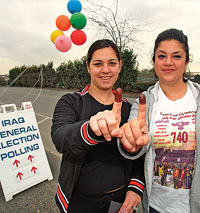 |
Velma Toma (left) and Suzie Younan from Modesto were among those who voted in the Iraqi national election. Polling took place at the Alameda County Fairgrounds in Pleasanton. The fairgrounds was one of three locations in CA where voting took place.
|
Naji Al-Said and Fadeha Al-Khafagi, a married couple from Beaverton, Oregon said they didn't mind driving 10 hours each way because it was the first time in their lives that they've been able to vote in an Iraqi election.
"We had a dictator before," Al-Said said, referring to former Iraqi leader Saddam Hussein.
He said, "We want to say thank you to Americans for doing everything for us."
Al-Khafagi said, "We never had freedom before."
The Pleasanton site is one of eight in the U.S. and one of three in California where Iraqis, both American citizens and Iraqi nationals, are electing a new Council of Representatives.
Voting in Pleasanton began Tuesday and continued through 9 p.m. Thursday.
Voting in Iraq began Thursday and continues through Saturday.
More than 200 political coalitions and about 7,000 candidates are vying for 250 seats on the council. Council members will serve for four years.
Vic Zikoor, a San Jose resident who serves on the Independent Electoral Commission of Iraq, said that when people go into the voting booths, they simply choose one coalition and don't vote for individual candidates.
Under the constitution recently approved by Iraqi voters, the Council of Representatives will pick a three-member presidential council and a prime minister.
It's been estimated that between 3,000 and 5,000 people will vote in Pleasanton, but Zikoor said he doesn't yet have any vote totals. He said the Pleasanton site was busier Tuesday than it's been today.
Zikoor, who has lived in the U.S. for 26 years, said the people voting in Pleasanton represent all of the many different ethnic groups in Iraq and pointed to a man who was dressed in colorful and traditional Kurdish clothes.
"All parts of Iraq are here today and they're all happy to be together," he said.
Zikoor said he hopes the election shows Iraqis that political change can be accomplished by voting instead of by force.
Zikoor said his relatives in Iraq say the country is not secure and they don't know if it's better or worse since the U.S. invaded Iraq in 2003.
But he said, "There's at least some optimism."
Hiskail had a more positive view of the U.S. presence in Iraq, stating, "We'd like American and British forces to stay in Iraq another five years to make sure everything is secure."
He said if the U.S. pulls out soon, "it won't be stable."
Hiskail, who has lived in Britain and the U.S. most of his life but travels to Iraq and frequently talks to his relatives there, said he thinks 90 percent of Iraqis agree with his belief that the U.S. should stay in the country for now.
Hiskail said three buses are going from Modesto to Pleasanton on each of the three voting days, with the buses able to hold at least 50 people at a time.
Jaafar Yosif of Everett, Wash. said he and 15 other people flew to the Bay Area today to vote and planned return tonight.
"We're definitely glad to vote because it's the first time we've been able to raise our voices," he said.
Four men from Seattle said they drove 13 hours today to vote and will drive another 13 hours tonight to get home.
As long as their drive was, they said it's still much shorter than the 22 hours each way they drove to and from Los Angeles in the election for an interim parliament in January.
After voting today, the men spread out rugs in the fairgrounds parking lot so they could pray and then they ate a lunch they had brought with them.
Although the atmosphere at the polling place was relaxed, there were security precautions nonetheless.
Voters had to go through a metal detector guarded by private security guards hired by the Independent Electoral Commission and several uniformed Pleasanton police officers were stationed near the voting booths.
Less Than 4,000 Ballots in San Diego
Courtesy of the San Diego Union-Tribune
17 December 2005
By Anne Krueger
(ZNDA: San Diego) A historic election for Iraq's new legislature drew about 3,900 expatriates to a converted banquet hall in El Cajon this week, a turnout that disappointed election officials.
The ballots were counted late Thursday following three days of voting at the Royal Palace Restaurant and Banquet Hall on Broadway near Second Avenue. The site was one of seven polling places in the country. Zohair Alameri, one of the election's local organizers, said he was disappointed in the turnout, considering that as many as 30,000 Iraqis live in San Diego County.
Turnout was just as low across the United States, a sharp contrast to the overwhelmingly high participation in Iraq.
But Alameri said he was heartened that Iraqis around the world got the chance to vote. Forty-five of the 275 seats in the National Assembly were set aside for out-of-country Iraqi voters casting ballots in 15 nations.
Voters made their selection from a four-page ballot listing in Arabic more than 300 slates representing more than 7,000 candidates.
"It's not the success of this slate or that slate," said Alameri, a civil engineer who works for the city of San Diego. "It's the success of the election."
Other election sites in the U.S. were set up in suburbs near Los Angeles, San Francisco, Detroit, Chicago, Nashville and Washington, D.C. Those who could show they came from Iraq or had a parent from Iraq were allowed to vote.
U.S. turnout was approximately 12 percent, with more than 28,000 ballots cast, vote organizers said yesterday. That was 4,000 more votes than elections for a constitutional assembly in January, though voting was streamlined this time around.
"I thought we were going to double the number (from January)," said Talal Ibrahim, deputy coordinator for the U.S. Iraqi vote. "I'm happy everything went smooth, but maybe my expectations were too high."
More than 70 percent of eligible voters in Iraq turned out for the election. Results are not expected to be announced for several weeks.
In El Cajon, the ballots were counted until early yesterday morning. Alameri said the results will be e-mailed to the Iraqi election commission in Amman, Jordan, and then the ballots will be hand-delivered to the commission.
Many Iraqis living in San Diego County are Chaldean, a Christian minority in Iraq. Among the slates that received a high number of votes at the El Cajon site was a Chaldean slate, with 1,192 votes; a slate backing former interim Prime Minister Ayad Allawi, with 721 votes; and a Kurdistan slate, with 798 votes.
Alameri said the election went smoothly and was well-organized.
"We want to tell the whole world these people are civilized and can handle freedom," he said.
Christian Persecution Growing
Courtesy of the Washington Times
15 December 2005
By Julia Duin
(ZNDA: Washington) An array of activists on 14 December offered a grim assessment of religious freedom around the world, saying that 2005 years after Jesus' birth, many of His followers are severely repressed.
The chief villains in a "Christmas Under Siege Around the World" panel at the Capitol were Indonesia, China, Uzbekistan, Iran and North Korea.
"Anti-Christian persecution and discrimination around the world ... is ugly, it's growing, and third, the mass media seem to generally ignore or downplay its gravity," Catholic Archbishop of Denver Charles Chaput said.
The press has been particularly remiss, he said, in covering Indonesia, where three teenage Christian girls recently were beheaded by Muslim militants.
"News reports tend to describe Indonesia's violence as generically 'sectarian,' as if Muslim and Christian extremists were mutually responsible," the archbishop said. "This is troubling and flatly false. The bloodshed is overwhelmingly provoked and carried out by Islamic militants against the Christian minority."
The archbishop was one of eight panelists who painted disturbing portraits of life for the average Christian in about a dozen countries.
The setting -- a small chamber off the Senate galleries with hot chocolate and cookies as refreshments and brightly colored buttons offering Christmas greetings in Chinese, Korean and Arabic -- was incongruous with large photos of a tortured or imprisoned Pakistani and Laotian Hmong Christians.
Jeff King, a panelist representing International Christian Concern, offered attendees a chance to view photos of the beheaded girls. There were no takers.
Indonesia, he said, had made it "practically impossible" for a Christian congregation to get a building permit. The government is drafting new laws about church buildings, "but the bottom line is, the cure is worse than the cold."
Notwithstanding the photos about the room of the second Bush inauguration, the Bush administration came in for criticism by Lawrence Uzzell, president of the International Religious Freedom Watch.
"We've known for the last decade that most of the State Department bureaucracy needs constant pressure to give these issues the attention they deserve," he said. "We now know that the White House also needs pressure, no matter which party is in power, sometimes especially with an administration that's tempted to think that it can take its religious supporters for granted."
Mr. Uzzell's chief complaint was with Uzbekistan and Turkmenistan, describing both as "remote desert dictatorships" that are "the most vicious persecutors of religious faith" among the former Soviet republics.
Muslims of all stripes get the brunt of bad treatment in Uzbekistan, he said, and the country's reputation as "among the leading torturers of all Eurasia" is a result of its horrendous treatment of even the most moderate Muslim.
"The fact that Washington has not named Uzbekistan and Turkmenistan as 'countries of particular concern' under the 1998 International Religious Freedom Act ought to be a major scandal," he said.
Uzbekistan is "one of the places where renditions are said to happen," he said, referring to the U.S. practice of sending foreign captives to Third World countries for imprisonment and torture.
"Some of our leaders have now become so obsessed with the war on terrorism ... that they are willing to overlook the most horrible violations of freedom and of basic morality by dictators who claim to be our allies in that war," he said.
The panelists, who were assembled by Sen. Rick Santorum, Pennsylvania Republican, included members of the Congressional Working Group on Religious Freedom and the U.S. Commission on International Religious Freedom.
Richard Land, who is a member of the latter, as well as president of the Southern Baptist Convention's Ethics & Religious Liberty Commission, portrayed North Korea as a country in which children are brainwashed from birth to worship the late Kim Il-sung and his son, President Kim Jong-il.
"Religion [is portrayed as] evil in the country's education system and media and at the reported 450,000 'Kim Il-sung Revolutionary Research Centers,' at which North Koreans are required to attend at least weekly sessions for instruction, inspiration and self-criticism," he said.
In Sri Lanka, Buddhist militants have attacked religious minorities -- mainly Christians -- 200 times in the past two years, he said, but its government has done nothing to stop it. Indeed, the Sri Lankan government's "toleration of violence" has encouraged Buddhist radicals to propose laws in its parliament punishing with up to seven years' imprisonment for the "crime" of attempted conversion.
As for China, "the scope of political openness and individual freedom is narrowing" there, especially during 2005, he said. Particularly worrisome, he said, are the penalties exacted for teaching children about God.
Then Eden Naby, an Assyrian scholar described how in Iraq, the land where the Magi are said to have originated, the Christian population is fleeing to Turkey, Syria and Jordan. She said Iraqi Kurdish soldiers openly had attacked Assyrian churches and warned that today's election in Iraq could open the door for Shariah, or Islamic law, throughout the country.
"It's time for fair-minded people to rally," she said, "because these last Aramaic speakers symbolize the move to eliminate Christianity from its native region."
Gamri Demands Release of Political Prisoners
from Syrian Jails
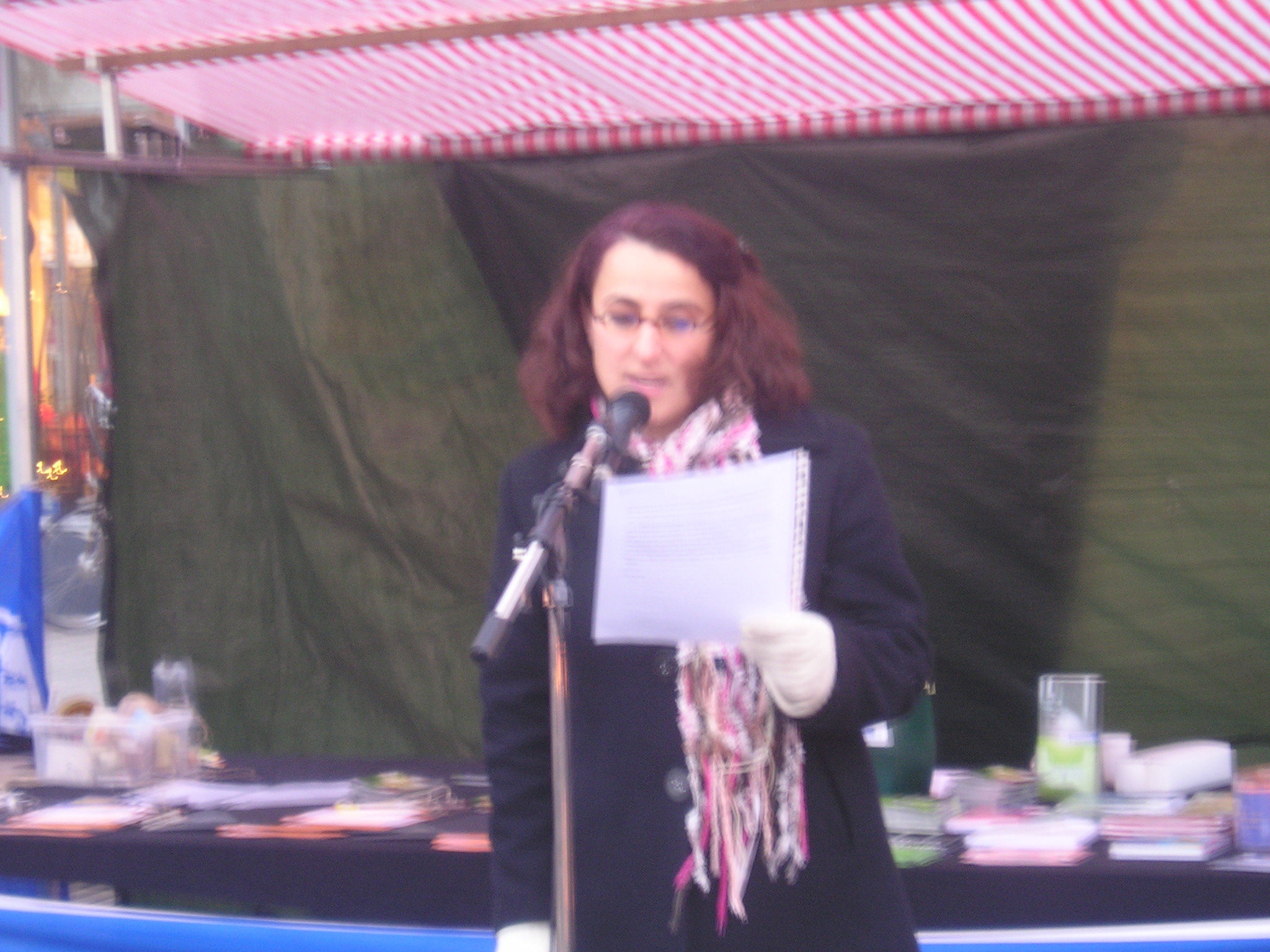 |
| Ms. Attiya Gamri speaking at a rally in Holland on the human rights abuses in Syria. |
(ZNDA: Amsterdam) On 10 December, to commemorate the signing of the 1948 Human Rights Declaration of the United Nations, Ms. Attiya Gamri - the Assyrian member of the Dutch parliament and representative for the province of Overijssel, spoke in Hengelo, Holland.
"I ask for your attention to the situation of the Assyrians and all others whose political views are being repressed. Together with the people who are gathered here, I call on Bashar Al Assad to free the political prisoners in Syria; they have our support. We are watching you, and we don't accept the repression."
Ms. Gamri was asked to monitor the human rights situation of the Syrian political prisoners. She has been focusing on the story of the Syrian political prisoner, Dr.
Haytem Hamwi, imprisoned since 2003.
Mr. Gamri noted that for years Assyrians have been imprisoned because of there political opinion. Until today there are people held in the Syrian prisons, just because they made use of their freedom of speech, explains Gamri.
There are 20,000 Assyrians currently living in the Province of Overijssel, half of whom fled from Syria in the past 15 years.
Australian Report Puts Spotlight on Assyrians
Courtesy of the Fairfield City Champion
9 December 2005
(ZNDA: Sydney) Assyrian population turned out in force last month for the launch of milestone report into their community.
Fairfield mayor, Nick Lalich, launched the report which was taken by the Assyrian Workers Network and the University of Western Sydney.
The report called for the strengthening of community development processes and an increase in awareness of the Assyrian community and its needs.
"It was a fantastic launch because of the mixture of the people who came," one of the co-authors, Paul Gorgees, said.
Prospect Federal Labor MP Chris Bowen was one of the dignitaries to attend.
Assyrian General Takes Tea with Fairfield Mayor
Courtesy of the Fairfield City Champion
14 December 2005
(ZNDA: Sydney) It's not often that you get to take high tea with a foreign diplomat, but Fairfield Mayor Nick Lalich has been doing quite a bit of this lately.
Just weeks after returning from a trip to Taiwan, where he hobnobbed with government officials, the Mayor enjoyed the company of another senior-ranked VIP, following a visit from Air Vice-Marshal Georges Hormis Sada.
The Assyrian general, who has played a key role in helping rebuild Iraq since Saddam Hussein’s regime was toppled, stopped by Fairfield’s Wakeley chambers for a 90-minute chat with Mr Lalich on the state of play in his home country.
“He is a very intelligent person and I found him tremendously interesting“, Mr Lalich said. “He expressed to me his hopes for the future of Iraq and its new government.”
Air Vice-Marshal Sada was forced to leave Iraq during Saddam’s reign but has since returned as a senior adviser with Iraq’s National Security Council.
Mr Lalich said his distinguished guest – now based in Britain – had also been called upon to counsel US President George W. Bush on foreign affairs in recent times.
“He has done some amazing things... [and] is a real peace activist”, Mr Lalich said.
Voters went to the polls in Iraq this week to elect a new Iraqi National Assembly.
Report Puts Spotlight on Assyrians
Fairfield's Assyrian population turned out in force last month for the launch of a milestone report into their community.
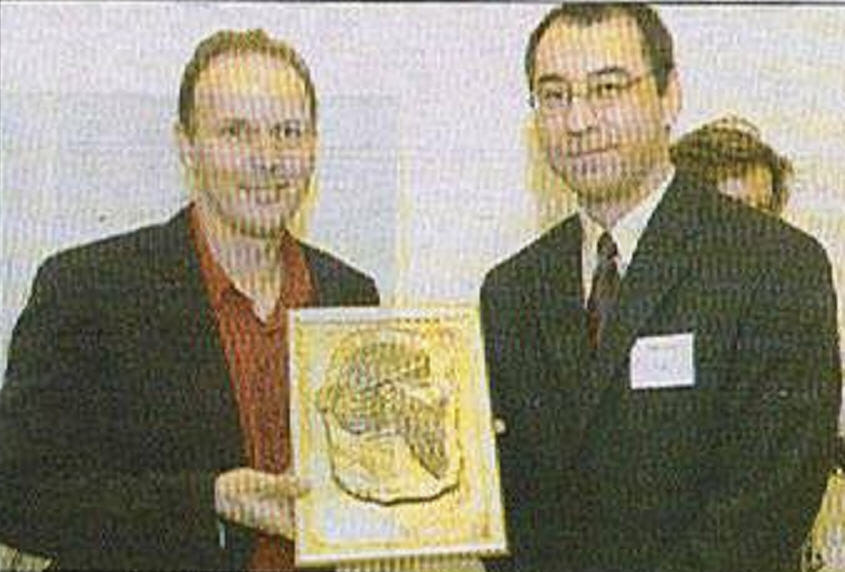 |
Dr. Greg Gow (L) and Ashur Isaac at the launch of the report. |
Fairfield Mayor Nick Lalich launched the report which was undertaken by the Assyrian Workers Network and the University of Western Sydney.
The report called for the strengthening of community development procecesses and an increase in awareness of the Assyrian community and its needs.
"It was a fantastic launch because of the mixtur of the people who came," one of the co-authors, Paul Gorgees, said.
Prospect Federal Labor MP Chris Bowen was one of the dignitaries to attend.
Mr. Gorgees said Mr. Bowen remarked on the Assyrian community's tendency to prosper and not solely rely on the government to solve its problems.
About 20,000 Assyrian live in Fairfield. During the past years about 2000 Assyrians have entered Australia under the humanitarian and refugee programs.
Other co-authors of the report including Marlin Babakhan, Kardonia Daawod, Ashur Isaac, and Dr. Gred Gow.
|
|
Surfs Up!
Your Letters to the Editor
|
On Church Reforms & True Beauty
Youel A Baaba
California
On Mark Thomas' Article
After reading Mr. Mark Thomas' commentary in the last issue of Zinda magazine, I was proud to see an Assyrian with so much love and faith in his ancestral church and his people. May God always bless him in whatever task he undertakes.
The significance of his commentary is his courage to openly address all those who are involved in this dispute and point out very clearly what needs to take place to bring peace and harmony in this church. I loved his commentary because:
1. He did not take any sides in this tragic dispute which has once again weakened this much divided and persecuted church.
2. He called for reconciliation and peace and this by itself fulfills one of Christ’s basic teachings. Blessed are the peacemakers; for they shall be called the children of God (Matt 5:9)
3. He clearly outlined what the church leadership must do to bring our church into the 21st century. The internal reform must take place and soon.
4. He highlighted the priority of liturgical reforms and modernization if we truly believe that we have something to hand down to the next generations.
5. He emphasized that church canons should be made available to members and that they should be applied justly to all who do not live by them.
6. He prayed for church unity among all Assyrians.
7. And finally, he has renewed my faith in lawyers.
On Miss World Canada
Congratulations to Ramona Amiri for winning the Miss World in Canada and making it all the way to China. Also, bravo for acknowledging her Assyrian heritage and greeting the world in her own language. She did not get the top place in China but in the world of Assyrians, she is our Miss World. God bless you.
What I Saw or Did Not See at the Elections Today
Michael Askaro
Australia
Today 15th Dec. I went to see the elections taking place by our Assyrians to have a voice in the Iraqi Government, but I saw something that disgusted me.
Upto 50 Assyrians had gathered in Fairfield Sydney, and more Assyrians were coming to give their voice for freedom and independence and to elect their representatives in Iraq. There was Zorna and Dawoola and Assyrians were holding Australian, Iraqi and Assyrian flags while dancing.
At this time, I saw a journalist/photographer for The Australian newspaper (which is well known in the country and is a nationwide newspaper) arrived with camera. I noticed that he talked to an Assyrian man who was holding the Australian and Iraqi flags and he started taking picture of the flags and completely ignored the Assyrian flag, which was held by an Assyrian lady at the head of the dance group. At this point, I approached the Australian photographer and said, “Mate (meaning “my friend” in Aussie slang), if you take pictures of those two flags (and I pointed to the Australian and Iraqi flags), then you should also take pictures of that one too which is the Assyrian flag, because it is important as well”. As I said that, he responded with “Is it?” and he went and took on more pictures of the group dancing and when he came to take pictures of the Assyrians dancing at the front of the group where the Assyrian flag was, he bent his knees and took pictures of the people (from below) the flag. By looking the way he was taking pictures and the angle of the camera, you could see that he did not intend to take any pictures of the flag. I looked around and noticed that some well known Assyrians saw what I saw that, but yet none was there to make a sound. For the second time, and this time very direct and forcefully I approached the photographer and said, “Hey mate, you took pictures of those two flags but none of that one which I told you it is important. The majority of these people are Assyrians, so take pictures of that flag too because if I don’t see it in The Australian, I will take it as you being discriminative and I will write to The Australian and will report your racist behavior”. At this point, he started taking pictures of the Assyrian flag.
What disgusted me in whole this situation, was not only the racism of the Australian photographer as much as the lack of courage in those well known Assyrians who saw whole this and did not utter a word, yet they talk about Assyria or Assyrian rights on community radios and etc. I am wondering if we are so afraid to speak to a photographer about a simple right of ours like this one, how can we achieve our rights in a country where Muslims surround us? Or do we not care about the Assyrian flag anymore? Is this the Assyrian spirit?
Assyrians Voting in Chicago
Polous Gewargis
Chicago
|
December 17 - 7:00 p.m.
Book Signing - Mar Addai Church Christmas Party
Assyrian American Civic Club of Turlock
2618 N Golden State Bl
Turlock, CA 95381
December 18 - 11:00 a.m.
Book Signing - Mar Zaia Assyrian Catholic Church of the East, 1457 Mable Ave.
Modesto, CA 95355
For More Information Click Here |
Chicago is the big city where thousands of Assyrians, Chaldeans & Syriacs live. Someone may ask, aren't these people living with a hope, desire or a wish for a better future for their people in Iraq??? Aren't they asking themselves: "How can I help to fulfill this wish? Do they think that by eating, drinking and sleeping, they can accomplish what they wish?"
To those people who do not give one hour of their time to add another brick in the path of success, to those people who do not want to drive 20 minutes to cast their vote to help their brothers and sisters and friends in our homeland, I say with sympathy that eating, drinking and sleeping will not make you a better person, and I am sorry to say that without joining the public and working hand in hand with other Assyrian brothers, you will be living your life waiting for the day until you face your Creator in the day of judgment, while others are working hard to bring a better future for all of our people everywhere around the globe. I feel sorry for those people who only think about themselves, they have denied their nationality, and have mostly become human beings without any national hope and without any national goal in life. It hurts me when I say these words, but what else can I say to people who will not give a helping hand and go out and cast their vote. That is all what is needed from them, not a big deal!!!
It is fair to mention, that some non-Assyrian Iraqis drove for 5 to 6 hours from different states to come to Skokie and cast their vote, but our people had the center within 20 minutes and did not bother to leave their homes to help their people.
I also want to say that the outcome of the current election depended on all of our Assyrian brothers and sisters, so if the outcome is not satisfactory, we should not put the blame on our organizations who tried very hard to promote this election. On the contrary we should blame ourselves for not participating and not joining the crowd. Every person who did not vote should blame himself/herself for the failure of this election. If there is a minimum of 30,000 Assyrian eligible voters in Chicago, then we should expect at least 20,000 votes in Chicago only. But, if the outcome shows only 7,000 votes then there is a big problem with the mentality of the so called “spectators” among our Assyrian people who live in the big city of Chicago. God help us all.
Kurdish President's Offer Not An Enduring Solution
Frederick P. Isaac
Australia
This is the same old wicked attempt to relegate the national identity of the Assyrian to a mere Christian resident. The aim behind this dubious call is to strand them with the Christian residents of Iraq, considering their return as part of the Iraqi Christian minority, and not as a separate nation in their own right.
Why is it that the Assyrian leadership, on the ground, does not make such an invitational statement, direct, to his Assyrian dispersed nation? Is it because the Assyrian leadership is fragmented and those in the so-called Kurdish Parliament are snubbed? Are such Assyrian leaders coerced, not allowed to work in the interest of the Assyrians to fulfill their aspirations? Are such Assyrian leaders influenced to follow their Kurdish and/or the guidelines of other masters, or else? Why should such an invitation come out from a Kurdish official and not through an Assyrian Leader? Has our subservience been transferred from Arab to Kurd? What is the usefulness of being an MP/leader if such a member has no actual voice to speak on behalf of his Assyrian people and represent their demands? Who is looking after the interest and future rehabilitation and resettlement of the dispossessed Assyrian Nation, now living in diaspora? Why should not the Assyrians have a slice of the pie? Are the Assyrians being called to gather and return home to live on crumbs at the mercy of the Kurds?
By arrogating Assyria, the Kurds downplay Assyria’s right to their homeland. Their call to seek refuge, under their protection, is like taking refuge among sheep in wolfs clothing. They are sitting on Assyrian land, playing the role of overlord protectors. It does not compute. It is iniquitous. It is scary.
Although the majority of the Assyrians live in diaspora, they look upon the Assyrian Leadership, in Iraq, as the official mouthpiece of its globally dispersed Assyrian Nation. The Assyrians should not be classified as a minority but as a dispossessed Nation. By virtue of their history and demography, the Assyrians are a nation in their own right. Assyrians in diaspora should not be treated as alien returnees. Assyria is their home. It does not belong to the Kurds, although the Kurds say that now it does, and all of the Land of Assyria? The Kurds are so selfish; they do not know even how to share to coexist in peace with their neighbours. To the Kurds, it is all or nothing!
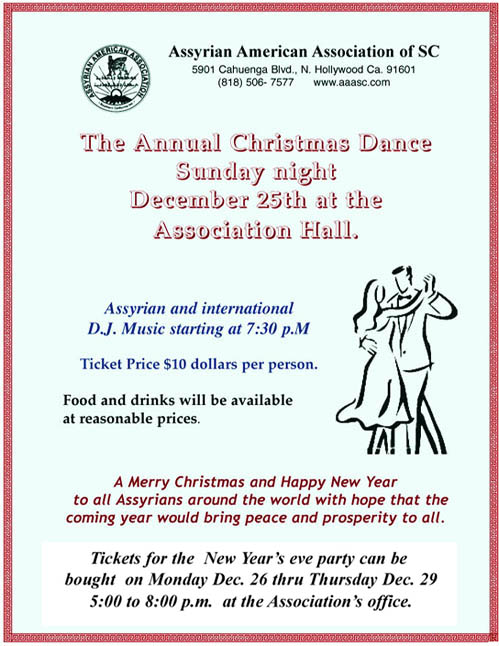 |
Assyrians want to return home to live within their own-bordered region – outside the influence and interference of the so-called Kurdish Administrative Region. Assyrians are entirely different from the Kurds in every aspect of life. The Kurds do not have anything in common with the Assyrians. Assyrian land, history, language, religion, and culture are entirely different from that of the Kurds. The Kurds have encroached on Assyrian land. Calling it “Kurdistan” is no more than a whitewash. Where would the Kurds accommodate the rest of the remaining twenty million (20) million gypsy Kurds? It is no surprise that the Kurds have an eye, on areas, beyond the arrogated Assyria.
Assyrians are historically an integral part of the Middle Eastern Region. And so are the Israelis and Arab Christians. Calling the Assyrians by their religious name as Christians, and not by their national identity, is a test case. If successful, it would become a precedent for Arab and Islamic nations, to challenge the existence of Assyria, Israel and even Lebanon in the not too distant future. Calling them by such dubious terms is to deny them their traditional rights to their homeland.
Though their number in Iraq is presently small, since Post World War I, the Assyrians, have been scattered all around the world. Their ethnic population, made up of several Assyrian derivatives is estimated at over three (3) million.
Including the Assyrian population in the total estimate of three per cent (3%) Christians in Iraq, and calling them as such, is a travesty. Assyrians, combined, make up over three percent (3%) on their own. There is no need for the Assyrians to be described as merely Christian, or for that matter be fused with other minorities as Christian to deny their racial identity.
Why call the other groups in Iraq like the Turkmen by their ethnic name, and not by their Moslem religion, yet keep on calling the Assyrians by their faith as Christian and not by their Assyrian National Identity. Is this not racial vilification? Why call the Kurd as such, whose nationality is not recognized internationally, while keep on calling the Assyrians, Christian, denying them their right to their genuine Assyrian nationality?
Why does the UN tolerate such discriminatory and abusive language? Or is it because the Assyrian is not included in the political equation? They are free to call the Assyrian by any name they wish except by his genuine national identity, just to keep the Assyrian marginalized. Is this their new brand of democracy? If advocates of democracy were really concerned over the unsettled question of Assyria, they would at least gather the Assyrians together; ensure their safety, in a secure environment, under protection of the United Nations.
Is this tactic to confuse the world of the true identity and need of the Assyrian people in order to disqualify them from demanding their natural rights?
The United Nations being aware of such constant provocations and abuse of human rights has an essential role to play in addressing this situation. Let us hope that in the end democracy will win.
Slate 740 is a Triumph for Unity
William Aprim
Chicago
 |
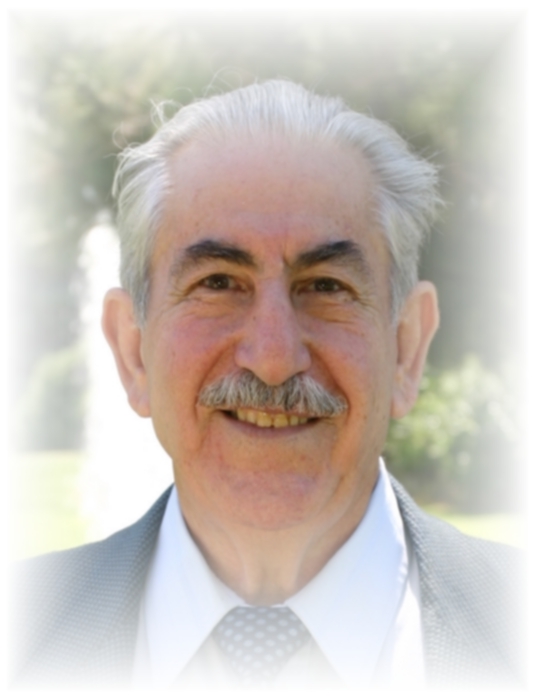 |
Modern Assyrian Language Guide
Volume I
by
Tobia Giwargis
(209) 667-6697
88 Pages
U.S. $20.00 / International $25
(includes shipping)
To Order Your Copy Contact:
Assyrian Club of Urhai
Education Committee
P.O. box 577762
Modesto, CA 95357 USA
|
Irrespective to the higher vote expectations as a result of great campaign efforts made by many dedicated persons throughout the election process and before, the updated results received today indicate a comfortable margin of victory for Slate #740. It is a giant credit for the patriotic ChaldoAssyrianSyriacs masses who came out loudly in support of our nationalistic goal.
It is worthwhile to mention, despite the spread of evil campaigning against the unity issue, and the timing of Assyrian Church Synod Meeting in Chicago, the people have spoken again. In this beautiful city and its suburbs, if voting was declared on a national referendum, the results would be 90% for ChaldoAssyrianSyriac front. The rest 10% will go to the sophisticated devil campaigning that is out to destroy our families, our faith, and disintegrate our political aspirations, forever.
Thanks to the people who voted in this election. Best wishes and congratulations to our blessed school of national education, ZOWAA, its leaders, scholars and subordinates, for their steadfastness, and loyalty to our nation. God bless all our concerned political parties who have unconditionally contributed all their resources for the success of this campaign. We appreciate their transparent stand.
USA - Democracy at Work?
Eyewitness report revealed today that a group of visiting Kurdish-descent American citizens/ residents from a neighboring state came for voting purposes, and were asked by the Security Officer on duty at the polling place, in Skokie, Illinois, to remove their Kurdistan Flag which one of the members was carrying on his shoulders, before entering the premises where voting were held. After some short discussion at the Election Commission's office, the exhibiting American and Iraqi Flags inside the building were removed by the security officer as a gesture, may be, as assumed by many onlookers, to please the incoming Kurdish voters, who perhaps, requested the right to equal freedom of expression. i.e: if we are not allowed to carry our Kurdish Flag, then no other flags should be displayed inside the building.
I was amazed that this was happening in this country where I am a proud citizen. This kind of situation indicates how democracy works in America. The country's Red,Blue and White, Flag that was proudly displayed by the hosting establishment, The Assyrian National Council Of Illinois, in respect of their proud loyalty to this country, was removed before the Kurdish group cast their vote.
As a concerned Assyrian, I feel deeply sorry for our people in Iraq. For they are in constant contact with unkind attitudes and tribal conflicts. I am a firm believer in the proverb that says "Quote- How can you bite a hand that feeds you Unquote.
What About Mar Aprem Mooken?
Joseph Haweil
Australia
After reading your article "500 Members of Australian Diocese Send
Open Letter to Patriarch" in the last issue, I was surprised to read in the 'Open Letter' a paragraph stating that Mar Bawai Soro is "the only recipient of PhD in theology among our clergy". This statement is incorrect and biased in its aim to paint the clergy in a negative light. I would have thought that the members of the "Committee in Solidarity with His Grace Mar Bawai Soro" would have done their research properly before making statements which are blatant lies!
Mar Bawai Soro is not the only recipient of PhD among our clergy. Mar Aprem Mooken, the Metropolitan of India has the following qualifications: B.D., M.Th., S.T.M., D.Th., Ph.D. Dr. Mar Aprem Mooken is one of the most learned bishops in our church and in other world churches. He regularly speaks at conferences on theology and Church history around the world and is a distinguished scholar. Mar Aprem is the author of over 65 books ranging from biographies, church history, travelogues, books in the Malayalam language and even 6 HUMOUR books! His biography even appeared in the International Who's Who of Intellectuals.
The below is "About The Authour" (page 296, "Patriarch Mar Dinkha IV, The Man And His Message, Trichur, India 2004, Mar Narsai Press by the Most Rev. Dr. Mar Aprem B.D., M.Th., S.T.M., D.Th., Ph.D.):
"The Most Rev. Dr. Mar Aprem (formerly George Mooken) was born in Trichur, Kerala, India, in June 1940. Educated in India, England and America, he specialised in Church History. He was the President of the Church History Association of India in 1976-1982.
He holds two master's degrees in Church History, one from the United Theological College, Bangalore (M. Th, of Serampore, 1966) and the other from the Union Theological Seminary, New York (S.T.M. degree, 1967). He was a candidate for Doctor of Theology (Th.D) degree at Princeton Theological Seminary, U.S.A., when he was consecrated Bishop in Baghdad, Iraq in 1968. Later he earned his D.Th. degree from Serampore University, near Calcutta. Mahatma Gandhi University in Kottayam granted a Ph.D degree in Syriac Studies to him in 2002.
Ordained a deacon on June 25, 1961, he became a priest on the day he completed twenty five years of age on 13 June, 1965. He was consecrated Bishop on 21st September, 1968 and promoted as a Metropolitan eight days later in Baghdad.
His biography appears in the International Who's Who of Intellectuals, Vol.6, Cambridge, the International directory of Distinguished Leadership, first Edition, U.S.A and others.
He was given 'Men of Achievement' Award of the International Biographical Centre, Cambridge, England in 1984, and the 'Medal of Merit' of the Coptic Orthodox Cultural Centre, Venice for his cultural and ecumenical achievements.
Since 1968, he is the Head of the Church of the East in India with his headquarters in Trichur. He is active in several religious and social organisations all over India."
It is unfair for people to attempt to brand and paint the the clergy of the Church of the East in a light which states that they are uneducated and unqualified. In my opinion Dr. Mar Aprem is a shining star in the world study of Christianity. In addition to Mar Aprem other clergy, including bishops, have degrees and qualifications in various fields.
Sabri Atman in Berlin
Mark Hacket
Germany
 |
Click Above Image for Order Information |
Sabri Atman, scholar, writer and humanist is very busy studying Seyfo. He started his tour here in Stockholm, then on to Vienna, Amsterdam, Brussels and the last week it was Berlin´s turn, the German capital city. He was invited by the members of the Mor Ephrem Syriac Church to speak about Seyfo ("Sword").
Berlin is the biggest city in Germany and very important in many different ways. There are about 6000 Assyrian living in Berlin and also many Turks (approx 1 million).
It is known that the Seyfo is a taboo subject in Turkey and also for many Turks who live outside Turkey. The Turkish media have been following Sabri Atman and have attended his seyfo lectures, although the reason is not clear.
Many Turkish media were present at the conference, like the well known Dogan News Agency and the largest Turkish newspaper Hurriyet and Milliyet. The Kurdish Media were represented by the Rizgari and Gelajew.
|

